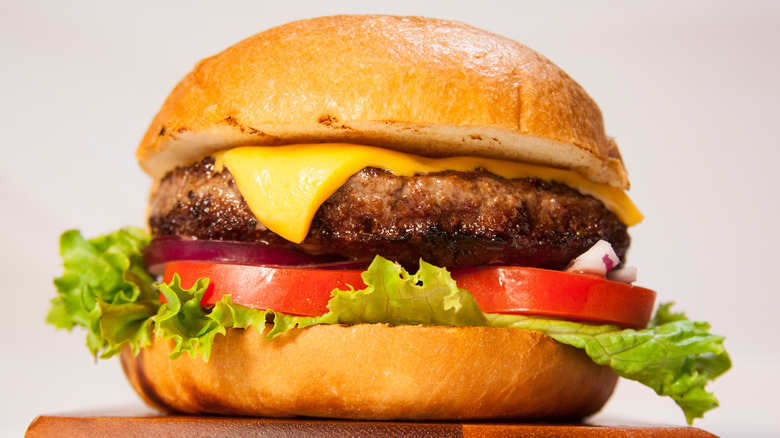The Burger Rule You Should Never Break, According To Anthony Bourdain
Anthony Bourdain had a way with words. Like few others in the industry, his descriptions could make you smile even when he was brutally critiquing a dish or trend. While often supportive of other chefs, certain foods weren't so lucky as described in his pull-no-punches takedown of brioche burger buns.
Originally shared on the critic's "Crimes Against Food" list, Bourdain explained, "The hamburger bun is designed to ABSORB grease, not add greasiness to the experience. A proper hamburger bun should retain its structural integrity, playing its role as delivery vehicle for the meat patty until the last bite. The brioche bun, woefully unsuitable for this role, crumbles. God is against the brioche bun," (via Thrillist).
After a comment like that, we don't even want to know what he thought of nontraditional burgers wrapped in lettuce, tortillas, or even a toasted sourdough! God forbid we use an English muffin. Bourdain is quite clear that burgers belong on burger buns — no need to complicate it.
The difference between burger buns and brioche
But, just what is a traditional burger bun? Traditional buns hail from Hamburg, Germany in the 18th century, according to Baking History. This burger (and bun) were widely popularized in the United States by White Castle and McDonald's. The bun consists of flour, sugar, water, salt, yeast, milk, butter, and pâte fermentée viennoise, which is a Viennese fermented dough. The bread is traditionally topped with sesame seeds. Modern forms of the burger bun may vary from these recipes, but as Bourdain points out — the idea is to provide a vehicle for sometimes greasy burgers, making a hamburger a handheld food.
Brioche, on the other hand, is considered French, not German in origin, per Taste Atlas. Brioche is known for its pillowy, if crumbly texture. Using many of the same ingredients as a traditional burger bun, brioche uses significantly more eggs and butter than a traditional sliced bread. This pastry also needs to proof twice. Perhaps having a history dating back even earlier than the Hamburg bun, there are mentions of "brioche" as early as 1404 with possible roots in Romania, France, and a classic Viennese bakery, before arriving at the recipe we know today.
Both breads are highly enjoyable, especially when cooked by a talented baker. When it comes to burger buns, however, we'll take Bourdain's tips under advisement.

